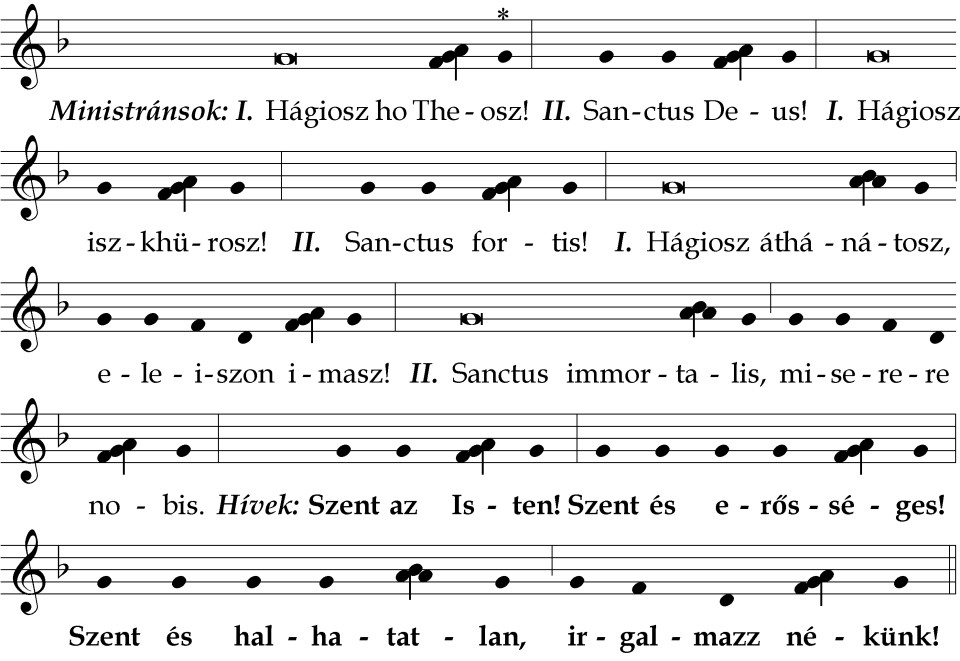
Медиатека Экзегет. Название произведения «Popule Meus Improperia», автор Джованни Пьерлуиджи
General Information Title: Popule meus Composer: Tomás Luis de Victoria Number of voices: 4vv Voicing: SATB Genre: Sacred , Motet Language: Latin Instruments: A cappella First published: 1585 2nd published: 1854 in Musica Divina Vol. II (Carl Proske), p. 42 3rd published: 1856 in Musica Sacra: Sammlung kirchlicher Musik, Teil 2, no. 38

Improperia Popule Meus YouTube
The Improperia appear in the Pontificale of Prudentius (846-861) and gradually came into use throughout Europe in the eleventh and twelfth centuries, finally being incorporated into the Roman Ordo in the fourteenth century. Improperia "Popule meus, quid feci tibi?" The Catholic Church and the Cultural Revolution

Ó, én népem (Impropériumok I.) (Popule meus (Improperia I.)) Liturgikus Népénektár
The Improperia are a series of antiphons and responses, expressing the remonstrance of Jesus Christ with his people. [1] Also known as the Reproaches, they are sung In the Catholic liturgy as part of the observance of the Passion, usually on the afternoon of Good Friday.

Popule meus [Improperia, Adoration of the Cross 14th15th Century, Ms. C55C56] YouTube
Juozas Naujalis — Popule meus Richard R. Terry — Improperia (The Reproaches) Text and translations Latin text Popule meus, quid feci tibi? Aut in quo contristavi te? Responde mihi. Quia eduxi te de terra Aegypti: parasti Crucem Salvatori tuo. Hagios o Theos. Sanctus Deus. Hagios Ischyros. Sanctus fortis. Hagios Athanatos, eleison himas.

Improperia Popule meus O.P. (Feria VI in Passione et Morte Domini) YouTube
IMPROPERIA. The reproaches directed against God's own people, and appearing as utterances of Jesus during the Adoration. of the Cross in the Roman liturgy of good friday. The first part of the Improperia consists of three verses (Popule meus, Quia eduxi te per desertum, and Quid ultra), including the trisagion.

Palestrina Improperia 1. Popule meus, quid feci tibi? YouTube
Popule meus, IGP 76 (Palestrina, Giovanni Pierluigi da) Genre Categories:. Improperia Alt ernative. Title Composer Palestrina, Giovanni Pierluigi da: I-Catalogue Number I-Cat. No. IGP 76 Language Latin Composer Time Period Comp. Period: Renaissance: Piece Style Renaissance:

Part II Popule meus (Improperia) YouTube
Popule Meus, also known as the ' Improperia ' or the ' Reproaches, ' is the hymn sung after the Adoration of the Cross on Good Friday. Here Christ reproaches the Chosen People, contrasting the innumerable favors God has bestowed upon them with the injuries He has received from their hands.

Improperia, "Popule meus, quid feci tibi?" by Musica Contexta on Amazon Music Amazon.co.uk
Improperia: Popule Meus for Good Friday. Every year for Good Friday, authentic liturgical choirs face the great decision of whether to sing the Improperia according to its amazing chant version or to vary that tradition with the introduction of polyphony. It is not easy because the chant edition is impossibly beautiful.

Popule meus Improperia Maiora LEGENDADO PT/BR YouTube
Improperia: Popule Meus. transcribed from Collection de musique tiree de la Chapelle Sixtine, appartenant de Mesplet, Bibliotheque Nationale de France, D-14499 & a sketch by Felix Mendelssohn Giovanni Pierluigi da Palestrina Ed. Henry R. Gaida. Coro 1o.

Popule Meus (Improperia) YouTube
The first part consists of three reproaches, namely, the Popule meus" (Mich., vi, 3), "Ego eduxi" (Jer., ii, 21) and "Quid ultra" (Is., v, 2, 40), the Trisagion (Sanctus Deus, Santus fortis, Sanctus immortalis) being repeated after each in the Latin and Greek languages. The second part contains nine reproaches pervaded by the same strain of.

Improperia Popule Meus YouTube
Popule meus (My people) is a motet for Good Friday by Tomás Luis de Victoria. He set a liturgical text from the Improperia, which contains the Greek-Latin Trisagion, prescribed for use in the Catholic responsory for Good Friday. It begins " Popule meus, quid feci tibi? " (My people, what have I done to you?).

Popule Meus In Adoratione Crucis (Improperia) YouTube
The first part consists of three reproaches, namely, the Popule meus" ( Micah 6:3 ), "Ego eduxi" ( Jeremiah 2:21 ) and "Quid ultra" ( Isaiah 5:2, 40 ), the Trisagion ( Sanctus Deus, Santus fortis, Sanctus immortalis ) being repeated after each in the Latin and Greek languages. The second part contains nine reproaches pervaded by the same strain.

Victoria Improperia Popule meus / Maîtrise de la Cathédrale NotreDame de Paris YouTube
There are three items in the set which optionally require 8 voices: besides the Miserere, the improperia Popule meus (no.27) has one choir singing in Greek alternating with another singing in Latin; and the ninth lamentation (no.30, Incipit oratio Jeremiæ) sets the final refrain (Jerusalem, convertere.

Improperia, "Popule meus, quid feci tibi?" (a) Good Friday Reproaches (Improperia) by Cambridge
The Improperia are the reproaches which in the liturgy of the Office of Good Friday the Saviour is made to utter against the Jews,. Each of these is a verse taken from some portion of the Scriptures and followed in every instance by the "Popule meus" as a sort of refrain. Originally these striking sentences were rendered to a plain-song melody.

Popule meus (T. L. de Victoria) & Improperia (Gregorian chant) YouTube
The Improperia are the reproaches which in the liturgy of the Office of Good Friday the Saviour is made to utter against the Jews,. Each of these is a verse taken from some portion of the Scriptures and followed in every instance by the "Popule meus" as a sort of refrain. Originally these striking sentences were rendered to a plain-song melody.

De Victoria Popule Meus Improperia sabbato sancto, per coro a 4 voci miste YouTube
Improperia; in Parasceve, in adoratione Crucis Composer Victoria, Tomás Luis de. ITV 163 Movements/Sections Mov'ts/Sec's: 7 sections Popule meus quid feci tibi? Coro I: Agios o Theos. Coro II: Sanctus Deus. Coro I: Agios ischyros. Coro II: Sanctus fortis. Coro I: Agios a thanatos eleison imas. Coro II: Sanctus et immortalis, miserere nobis.